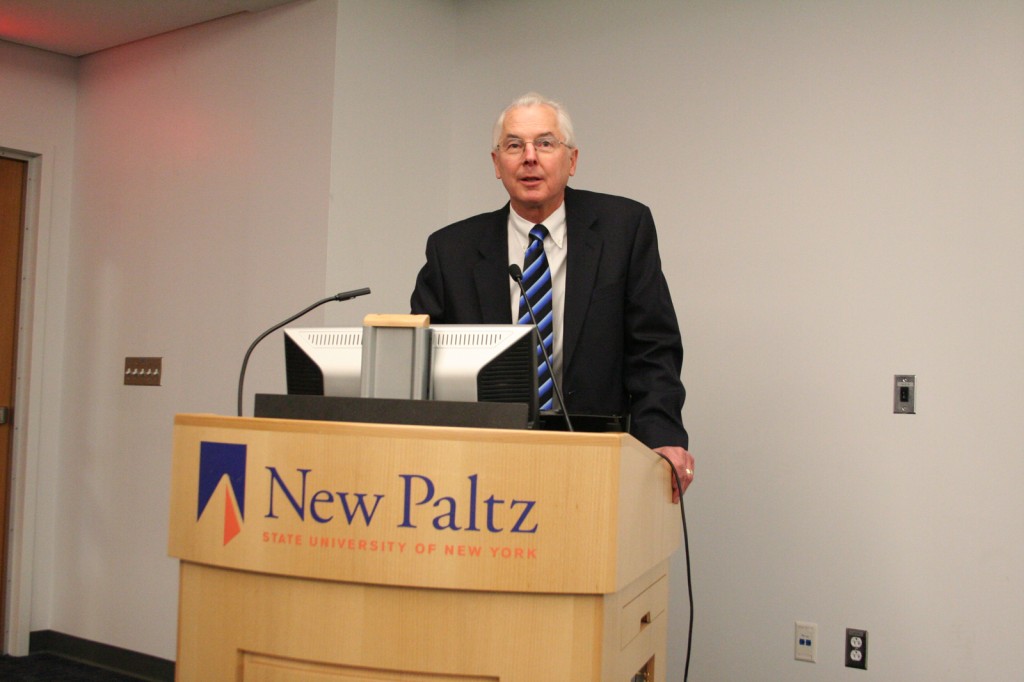

SUNY New Paltz administrators and union leaders are advocating for the implementation of a rational tuition policy to fill in budgetary gaps caused by cuts in state taxpayer support.
With help from United University Professions (UUP) Chapter President Richard Kelder and Civil Service Employees Association Local President Anthony Adamo, Interim President Donald Christian said he has begun encouraging the state Legislature and members of the public to support annual tuition increases to offset the college’s estimated $6.3 million deficit.
“[A rational tuition policy] would give us better financial predictability from year to year,” Christian said. “We face the challenge here as institutional leaders of defining the resources we need to provide students with high quality and the right array of educational opportunities. I would rather have money coming from taxpayers, but at the end of the day, a dollar is a dollar.”
According to Christian, during the last 48 years there have been 13 intermittent SUNY tuition increases. Rather than raising 2 or 3 percent, he said tuition jumps have ranged from 7 to 42 percent.
If a rational tuition policy were applied, Christian said the SUNY Board of Trustees would have the ability to raise tuition up to a certain percentage cap that has yet to be determined, and students could avoid “tuition roulette.”
“Many families put into those situations get caught in a bind,” he said. “We think it would be preferable for a student to come here as a freshman knowing, along with their parents, that it is possible tuition would increase a small amount over the next four years rather than not knowing.”
In order for the policy to be most effective, Kelder said rises in tuition would have to be examined to consider the economic climate of New York, as well as demographics and the ability of students and parents to pay.
While a “modest” increase in tuition would help provide more revenue for SUNY, Kelder said no citizen should look at this policy as a replacement for the restoration of funds or the conservation of Pell grants and aid.
“The fear is, you keep on increasing student tuition and the support for public higher education gets pulled back,” he said. “What you have there is a move toward privatization. You still have to have support for public higher education and that’s the New York State Legislature’s job.”
Despite Kelder’s stance, not all members of UUP in New Paltz are in full agreement on the implementation of a rational tuition policy.
UUP Outreach Committee member and former UUP President Glenn McNitt said he is entirely against the various versions of rational tuition policy discussed by SUNY Chancellor Nancy Zimpher, campus administration, the Student Assembly and others.
“The chancellor and campus presidents have a simple plan for dealing with the budgetary issues of each campus – reduce the budget at each campus by reducing its course offerings, increasing class size, reducing the number of employees and increasing tuition,” he said. “Get less but pay more.”
According to McNitt, it would not be in the college’s benefit to remove the Legislature’s ability to set the college’s tuition, as it has given New York State residents the lowest tuition in the northeast.
McNitt said his main argument against rational tuition policy, however, is that it will sully the purpose for which public universities exist: to provide access to those who can’t afford to enroll in private universities.
“Having public facilities permits many strata of society, especially low and middle income families, the opportunity to pursue potentially life changing experiences,” he said. “Every time tuition increases occur, the opportunities for these groups diminish.”
Student Association (SA) Vice President of Academic Affairs and Governance Caitlin Ryan said she also fears a rational tuition policy could ultimately cut off access to education through a form of social discrimination.
Ryan said members of the SA Executive Board are against the policy.
“We understand the rationale behind it,” she said. “It’s hard to plan for college when you have no idea what the prices are going to be like. But if there’s a rational tuition increase policy, it’s just not going to solve the problem.”
Christian said the administration is committed to affordability and do have concerns about hurting access for students who can’t pay for tuition increases. As part of efforts for fundraising, he said the administration is working on increasing scholarship support – particularly need-based scholarships.
There are also options like the American Opportunity tax credit, which Christian said provides up to $2,500 of tuition tax credit for families with incomes of up to $160,000.
“My concern [is] that many legislators see the $5,000 maximum Tuition Assistance Program (TAP) award and see our tuition at $4,970 and say, ‘We can’t raise tuition above the TAP award,’” he said. “Even if tuition increases above the TAP award, because of the tuition tax credits that are available, tuition can still be affordable and within the TAP cap.”
With push from state officials, the discussion of a rational tuition policy has continued to grow. On March 22, SUNY trustees adopted a proposal that authorizes Zimpher to negotiate with the Legislature and governor a rational tuition plan that would last a period of five years.
Christian said that while the SUNY rational tuition policy asks for a tuition increase beginning in fall 2012, he has continued to speak with legislators to advocate for a policy to start as early as this fall.
